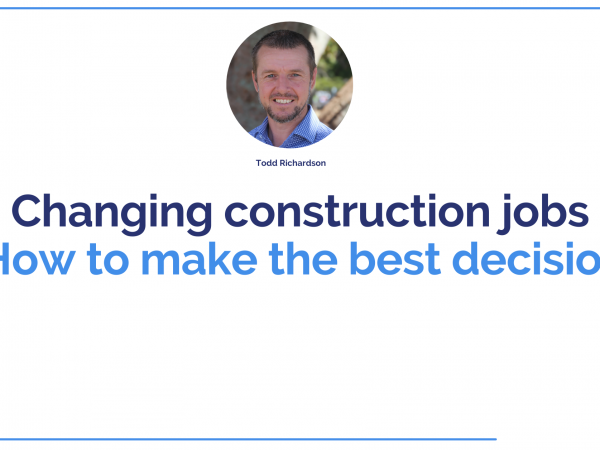For part 2 of our discussion on the pros and cons of working in each of the different tiered builders, we’re taking a look at your smaller builders.
To catch up on the first part of this discussion (where we look at large builders) – head here.
Gain exposure to the entire construction process
If you want a broader skillset and more variety in your workload – working for a smaller builder is something to consider. With less hands-on-deck in these companies, you will have greater project diversity than you would in a large builder. You’ll also gain exposure to a wider range of tasks and responsibilities during the delivery phase.
Hence, there is a real opportunity to understand the entire construction process beyond just your role when working for a smaller builder. You’re also less likely to be pigeonholed into a particular part of the industry, which we often see create roadblocks for candidates looking to do something different.
On top of this, you’ll have greater access to a builder’s owners/directors when the business is small. And in our experience, these business leaders are very willing to provide their staff with mentoring opportunities. For you, this means having a say in business activities and the chance to gain a business understanding of the industry, not just an understanding of how to build a project.
This exposure will be particularly useful if your goal is to start your own business down the line.
The Con:While you’re often limited to your role in a larger builder, you will gain a significant amount of exposure in that particular role. This in-depth experience is less available in smaller builders. The old adage jack of all trades master of none comes to mind here, and we sometimes see this hold candidates back when looking to move from a smaller to a large builder.
Increased work/life balance
If you’re looking to sustain or gain more work/life balance in your life – I would recommend a role in a smaller builder. It is, in general, much more attainable in this space. Why? Because the size and complexity of the jobs carried out by these builders are smaller and less technical. There are also fewer control processes in the project delivery phase, which allows these builds to have higher productivity and therefore move forward at a quicker pace. While this isn’t always the case (it varies from builder to builder), in general, it’s what we’ve seen.
The Con: I mentioned this in part 1 of this discussion, but I’ll say it again – the biggest downfall we see when working for a smaller builder is that, in general, salaries are less competitive than in your larger builders. This variation comes as a result of what we’ve just discussed: the size, scope and complexity of works being carried out in your smaller builders. So, while increased work/life balance is great, if your salary is a key driver in your employment decision, this is something you should weigh up.
More opportunity to progress up the career ladder
Career progression is often more attainable when working in a smaller builder. We’ve seen this become increasingly prominent as projects in your mid and top tier builders become larger while profit margins continue to be squeezed. Hence, taking a chance on a less experienced professional in this environment, such as a Contract Administrator trying to become a Project Manager, is a risk – and it’s not something larger builders are generally willing to do.
The perceived risk of letting a less experienced professional take the lead on a project isn’t as high in smaller builders, so the opportunity to progress is easier to come by.
The Con: While smaller builders are a great environment for those looking to step up, if your goal is to deliver on multimillion-dollar projects, you’ll eventually need to move on from this space. Project experience in this dollar value range is something you’ll only find in your large builders.
Before I wrap up this discussion, I again want to stress that there is no right or wrong employer. Your personality, preferences and career goals should drive who you work for. That’s why it’s crucial to understand the pros and cons of working in the different tiered builders before starting out your job search. What works for some won’t work for others.
I hope this has helped you to gain a better understanding of what tiered builder would work best for you. To discuss any of this information with us further, please don’t hesitate to reach out to our team.
Looking for your next construction job? Search our current construction roles here, or to chat to our team about securing your next opportunity, get in contact with us through our Contact Us page.
Receive our updates straight to your inbox



